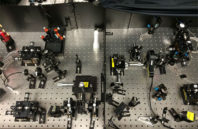Scientists have demonstrated a time-resolved spectroscopy technique that enables the study of very fast processes in samples on the femtosecond (fs) time scale without the need for an fs laser or a complex detection system. The method works by analyzing quantized light transmitted through a sample. It relies on single photons to study the interactions and processes occurring in the samples and ordinary lasers to produce the photons.
Researchers from Lomonosov Moscow State University (MSU) demonstrated that by exploiting quantum two-photon interference of entangled photons, it is possible to measure the dephasing time of a sample on the fs time scale, down to 100 fs, using a continuous wave laser and single-photon counting.
Researchers built an experimental setup to measure the two-photon interference pattern with and without a test sample. A basic interferometer was used to measure the interference. A nonlinear crystal was situated on the cw-laser path in the assembled system, and pairs of entangled photons were created.

 (585) 768-2513
(585) 768-2513

